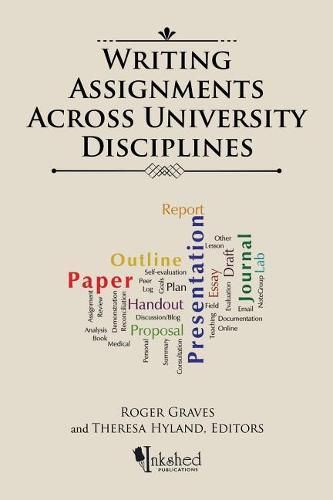Readings Newsletter
Become a Readings Member to make your shopping experience even easier.
Sign in or sign up for free!
You’re not far away from qualifying for FREE standard shipping within Australia
You’ve qualified for FREE standard shipping within Australia
The cart is loading…






This title is printed to order. This book may have been self-published. If so, we cannot guarantee the quality of the content. In the main most books will have gone through the editing process however some may not. We therefore suggest that you be aware of this before ordering this book. If in doubt check either the author or publisher’s details as we are unable to accept any returns unless they are faulty. Please contact us if you have any questions.
Writing Assignments Across the University Curriculum as a whole asks and answers these questions: What kinds of documents do students write in a wide range of university degree programs in Canada? How do instructors structure those writing assignments? That is, who is the audience for the assignments? Do students get formative feedback as they develop their documents? Do the patterns we found in a small liberal arts college (Graves, Hyland, and Samuels 2010) occur in other kinds of universities? We took our cue from an article by Anson and Dannels (2009) who pointed us toward the idea that students experience a curriculum through their degree progress in an academic program. Consequently, we needed to map the writing assignments according to how different departments organized these degree programs. Results that were organized by curricular unit (departments, faculties or colleges, or programs/units) were more significant than general statistics because students would progress through these courses to a degree. Several chapters in the book describe how this kind of curricular mapping provided a spark for curricular reform in Engineering, Education, and an entire small university. The last two chapters report on the instructors? perspective on their assignments: what they were intending to do, and why they both resisted and engaged in curricular discussions.
$9.00 standard shipping within Australia
FREE standard shipping within Australia for orders over $100.00
Express & International shipping calculated at checkout
This title is printed to order. This book may have been self-published. If so, we cannot guarantee the quality of the content. In the main most books will have gone through the editing process however some may not. We therefore suggest that you be aware of this before ordering this book. If in doubt check either the author or publisher’s details as we are unable to accept any returns unless they are faulty. Please contact us if you have any questions.
Writing Assignments Across the University Curriculum as a whole asks and answers these questions: What kinds of documents do students write in a wide range of university degree programs in Canada? How do instructors structure those writing assignments? That is, who is the audience for the assignments? Do students get formative feedback as they develop their documents? Do the patterns we found in a small liberal arts college (Graves, Hyland, and Samuels 2010) occur in other kinds of universities? We took our cue from an article by Anson and Dannels (2009) who pointed us toward the idea that students experience a curriculum through their degree progress in an academic program. Consequently, we needed to map the writing assignments according to how different departments organized these degree programs. Results that were organized by curricular unit (departments, faculties or colleges, or programs/units) were more significant than general statistics because students would progress through these courses to a degree. Several chapters in the book describe how this kind of curricular mapping provided a spark for curricular reform in Engineering, Education, and an entire small university. The last two chapters report on the instructors? perspective on their assignments: what they were intending to do, and why they both resisted and engaged in curricular discussions.